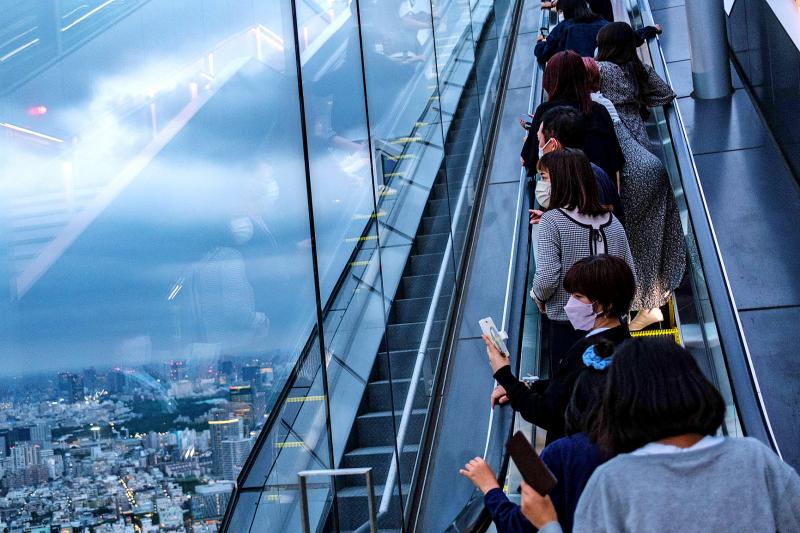More than 90 percent of Japanese believe Japan should prepare for a Chinese invasion of Taiwan, a Nikkei poll released on Monday found.
On how to prepare for an invasion of Taiwan, 41 percent of respondents said Japan should improve its capability of responding to a conflict in Taiwan by revising its laws, while 50 percent said the country should prepare within the existing legal framework and 4 percent said preparations are not needed.
In addition, 56 percent of respondents approved of a proposal by the Liberal Democratic Party-led government to increase the defense budget to 1 percent of Japan’s GDP, while 31 percent disapproved, marking little change from a poll last month.

Photo: AFP
About 60 percent of respondents agreed with preserving a military capability to strike back at an enemy — twice as many as the 30 percent who opposed the notion.
Under current Japanese law, Japan may exercise the right to self-defense if it or a close ally, such as the US, came under military attack.
However, Tokyo lacks the legal authority to build up stockpiles or render other military assistance to its allies unless the emergency is formally recognized, Yoji Koda, former commander-in-chief of the Japanese Self-Defense Fleet, was cited as saying.
Russia amassed forces near the borders of Ukraine before invading, which suggests a similar military buildup would precede a military invasion of Taiwan, he said.
That Japan “has no law that allows the US military to temporarily stockpile huge amounts of fuel and ammunition during normal times” might impede Japan’s ability to provide logistical support for US operations throughout the Indo-Pacific region, he added.
The poll, conducted by Nikkei Research from Friday through Sunday by telephone among Japanese men and women aged 18 or older, drew 935 valid samples and had a response rate of 41.4 percent.

AIR SUPPORT: The Ministry of National Defense thanked the US for the delivery, adding that it was an indicator of the White House’s commitment to the Taiwan Relations Act Deputy Minister of National Defense Po Horng-huei (柏鴻輝) and Representative to the US Alexander Yui on Friday attended a delivery ceremony for the first of Taiwan’s long-awaited 66 F-16C/D Block 70 jets at a Lockheed Martin Corp factory in Greenville, South Carolina. “We are so proud to be the global home of the F-16 and to support Taiwan’s air defense capabilities,” US Representative William Timmons wrote on X, alongside a photograph of Taiwanese and US officials at the event. The F-16C/D Block 70 jets Taiwan ordered have the same capabilities as aircraft that had been upgraded to F-16Vs. The batch of Lockheed Martin

GRIDLOCK: The National Fire Agency’s Special Search and Rescue team is on standby to travel to the countries to help out with the rescue effort A powerful earthquake rocked Myanmar and neighboring Thailand yesterday, killing at least three people in Bangkok and burying dozens when a high-rise building under construction collapsed. Footage shared on social media from Myanmar’s second-largest city showed widespread destruction, raising fears that many were trapped under the rubble or killed. The magnitude 7.7 earthquake, with an epicenter near Mandalay in Myanmar, struck at midday and was followed by a strong magnitude 6.4 aftershock. The extent of death, injury and destruction — especially in Myanmar, which is embroiled in a civil war and where information is tightly controlled at the best of times —

China's military today said it began joint army, navy and rocket force exercises around Taiwan to "serve as a stern warning and powerful deterrent against Taiwanese independence," calling President William Lai (賴清德) a "parasite." The exercises come after Lai called Beijing a "foreign hostile force" last month. More than 10 Chinese military ships approached close to Taiwan's 24 nautical mile (44.4km) contiguous zone this morning and Taiwan sent its own warships to respond, two senior Taiwanese officials said. Taiwan has not yet detected any live fire by the Chinese military so far, one of the officials said. The drills took place after US Secretary

THUGGISH BEHAVIOR: Encouraging people to report independence supporters is another intimidation tactic that threatens cross-strait peace, the state department said China setting up an online system for reporting “Taiwanese independence” advocates is an “irresponsible and reprehensible” act, a US government spokesperson said on Friday. “China’s call for private individuals to report on alleged ‘persecution or suppression’ by supposed ‘Taiwan independence henchmen and accomplices’ is irresponsible and reprehensible,” an unnamed US Department of State spokesperson told the Central News Agency in an e-mail. The move is part of Beijing’s “intimidation campaign” against Taiwan and its supporters, and is “threatening free speech around the world, destabilizing the Indo-Pacific region, and deliberately eroding the cross-strait status quo,” the spokesperson said. The Chinese Communist Party’s “threats